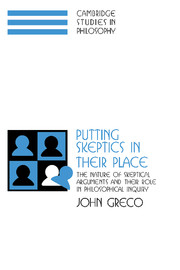 Putting Skeptics in their Place
Putting Skeptics in their Place Published online by Cambridge University Press: 03 November 2009
This book is largely the result of snide remarks from my colleagues at Fordham University. I arrived there very interested in skeptical problems, and people like Vincent Colapietro and Merold Westphal would wonder, out loud, why. One time, after I had presented a paper to the department on Humean skepticism, Chris Gowans bluntly asked me why anyone should find this sort of thing interesting. On another occasion, I was asked why I had my heart set on raising the dead – Hume had already been refuted, so why bother doing it again? Remarks like this were only half serious, but they were frequent enough to set me thinking about why I was so interested in skeptical arguments. It certainly was not because I thought that skepticism might be true. In fact, in this sense I was far less skeptical than most of my colleagues. Rather, I came to realize that my interest in skepticism was methodological. Along with a great many other epistemologists, I was interested in skeptical arguments because I thought that they could teach substantive lessons about the nature of knowledge and evidence. It was part of my methodology, in fact, to assume that skepticism is false, and that skeptical arguments must go wrong somewhere. The trick was to say where, and to learn the philosophical lesson contained therein.
To save this book to your Kindle, first ensure [email protected] is added to your Approved Personal Document E-mail List under your Personal Document Settings on the Manage Your Content and Devices page of your Amazon account. Then enter the ‘name’ part of your Kindle email address below. Find out more about saving to your Kindle.
Note you can select to save to either the @free.kindle.com or @kindle.com variations. ‘@free.kindle.com’ emails are free but can only be saved to your device when it is connected to wi-fi. ‘@kindle.com’ emails can be delivered even when you are not connected to wi-fi, but note that service fees apply.
Find out more about the Kindle Personal Document Service.
To save content items to your account, please confirm that you agree to abide by our usage policies. If this is the first time you use this feature, you will be asked to authorise Cambridge Core to connect with your account. Find out more about saving content to Dropbox.
To save content items to your account, please confirm that you agree to abide by our usage policies. If this is the first time you use this feature, you will be asked to authorise Cambridge Core to connect with your account. Find out more about saving content to Google Drive.